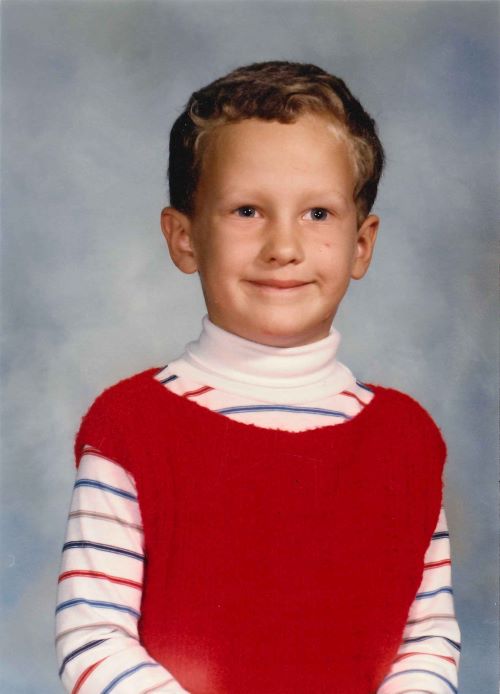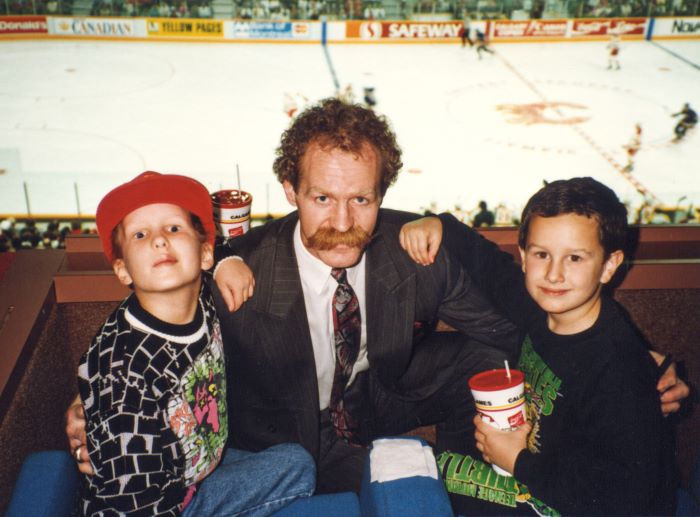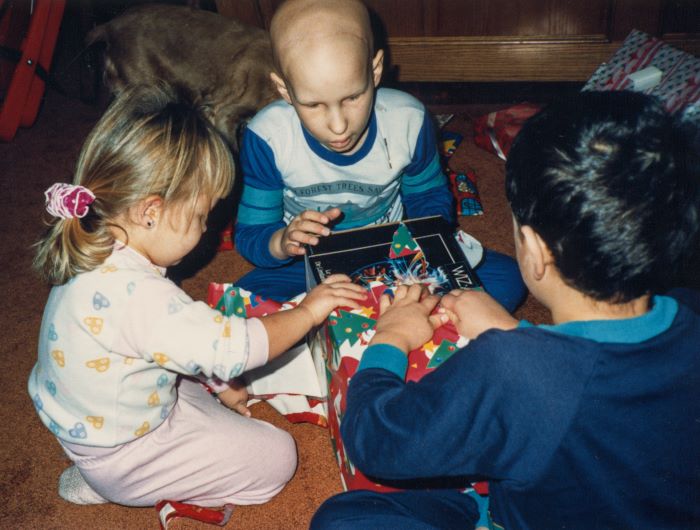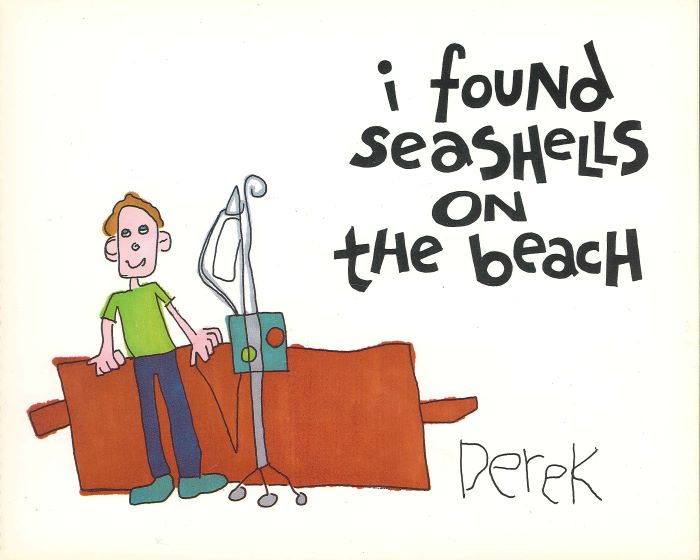At this time of the year in 1986, I was a young mother, busy preparing for Christmas. I had no idea how quickly our life would change and how far- reaching that change would be.

On Christmas Eve in 1986 my whole world shattered, when I found myself in the waiting room of the ICU at the Alberta Children’s Hospital, staring at a Christmas tree. The neurosurgeon had just removed a tumour, the size of a mandarin orange, from my five-year-old son Derek’s brain. I kept thinking to myself, “This can’t be real.”
Derek was diagnosed with medulloblastoma, an aggressive brain cancer, and we were about to embark on a journey from which we’d never fully return.
On Christmas Day, Derek laid unconscious in his hospital bed and remained unconscious for the next two days. When he woke, Derek could not walk, talk or see. How frightened he must have been. Numerous doses of radiation, daily physiotherapy and occupational therapy followed for Derek. One thing remained consistent, Derek loved getting visitors in his hospital room.
On January 30, 1987, I brought Derek home in a wheelchair to celebrate Christmas. Our house looked as though time had stood still, yet so much had changed. The Christmas tree in the living room was surrounded by brightly wrapped presents. My Mother made Nasi Goreng, Derek’s favourite dish for Christmas dinner and we savoured each other’s company. Christmas had waited for Derek and our family, but I knew it wouldn’t wait forever. We cherished every moment we had together.

Derek’s brain tumour paralyzed the right side of his face, leaving him with a crooked little smile. That crooked smile bothered him so much. Whenever I asked if he could have anything in the world, his response was always, “to be able to smile on both sides again.” Derek’s smile represented normalcy to him. At the age of eight, Derek underwent a nerve graft from one of his calves and had it transplanted into his face in the hopes of regaining his full smile. Unfortunately, Derek relapsed shortly after and the chemotherapy destroyed the new cells that had grown to help restore his beautiful smile.
In April of 1989, Derek developed another brain tumour, which they removed. He relapsed again in November 1990 and in December that year we started him on a clinical trial at the National Institutes of Health in Bethesda, Maryland. He endured excruciatingly painful treatments, while putting on a brave face. Like any child, Derek just wanted to live, and to Derek, treatment meant hope.

On Christmas Eve in 1990, once again, I found myself wondering about the meaning of Christmas. Derek’s doctor told me that the experimental treatment was not working and there was nothing more they could do. We agreed to end his treatment.
Derek was so excited to turn 10, but he died at home in my arms on April 26, 1991, just months before his 10th birthday. Before he passed, I made a promise to Derek that I would say his name every day and tell everyone that he was almost 10.
Although Kids Cancer Care was born out of a mother’s love for her child, I do not consider it to be my greatest achievement. I think most of us would say our children are our greatest achievements and, while I agree with that, there is one achievement that tops everything. My greatest achievement was helping Derek to die at home. It is a terrible irony, but this, I believe, is my defining moment and by far my greatest achievement.

To die at home was one of Derek’s final wishes. He was nine years old and did not want to go back to the hospital. Derek had spent the better part of his life there, battling the brain tumour that was now taking his life. He wanted to be at home, surrounded by his family and all that was familiar to him. To care for Derek at home in his final days — well, I have never been so afraid of anything in my entire life. I had no idea what to expect. I had cared for him every day of his cancer journey — every day of his life — and now we were coming to the end. I didn’t know how to do that.
Derek taught me so much during his cancer journey. He taught me courage and strength, perseverance and optimism. He taught me how to grow and learn through adversity. He showed me what is truly important in life. Now, I see the world through his eyes and joy behind every crooked little smile.
It was Derek who inspired me to start Kids Cancer Care and it is his memory that gets me out of bed every morning, determined to do more for children like him.
When I began the cancer camp programs for children in 1991, the year Derek died, the purpose was to help children like Derek enjoy the simple pleasures of summer camp. Children with cancer need to have normalcy and a sense of control in their lives. They lose this when they are diagnosed with this disease. A week at summer camp, where they can still receive cancer treatments, seemed like a good start. But it was just the beginning.

Over the years, Kids Cancer Care grew into a multi-faceted organization. Summer camp grew into year-round wellness and recreation programs. We started sending siblings to camp and began offering Family Camp.
In 1999, we expanded our mission to include funding for children’s cancer research here in Calgary. We also started funding hospital programs to ensure that children with cancer receive the care and support necessary to make their journeys as comfortable and tolerable as possible.
Recognizing that childhood cancer survivors sometimes face treatment-related learning issues, we added education support and scholarship programs.
The financial hardship that befalls families of children affected cancer can be devastating. With generous community support, we established the Derek Wandzura Memorial Scholarship Fund in 2007 to level the playing field for these families. The scholarship fund is a testament to the fact that more and more children are surviving this disease. They are growing up and eager to live their dreams with the help of post-secondary education.
Because cancer treatments can affect a growing child’s brain development, some survivors need extra help to get to post-secondary education. Again, with generous support from the community, our one-to-one tutoring program was established in 2016 to give kids a solid foundation in their primary and secondary school years to set them up for life.

For me, these education programs are a bitter-sweet legacy to my little boy who didn’t get to grow up and realize his dreams. In fact, he was never able to read because the tumour and cancer treatments so badly damaged his brain. And yet, Derek was the ONE person who inspired me the most in life. He taught me to grow and learn and ultimately to face the biggest lessons of my life. The greatest education of my life came from Derek.
And now, thanks to you, we have a therapeutic exercise program and offer child life services to help children manage their fear and anxiety around medical procedures.
Today, I would change only one thing. It would be to have built Kids Cancer Care without having to lose my son — that beautiful little boy with the curly, blond hair and a lively spirit and sense of humour that would light up rooms.
You are likely reading this because you are part of the Kids Cancer Care family. Or perhaps you have been impacted by adult cancer. Whatever your reason for reading, I thank you. Thank you for taking the time to share in our family’s journey.
I wish you and those you love have a happy, healthy and hopeful New Year.
— Christine McIver, M.S.M., LLD (Hon), CFRE, Founder and Chief Executive Officer Kids Cancer Care Foundation of Alberta
With your financial support, Kids Cancer Care is able to provide essential programs designed to meet the needs of the whole family at each stage in the child’s cancer journey — from diagnosis through treatment and beyond.


Bethesda, Maryland
















